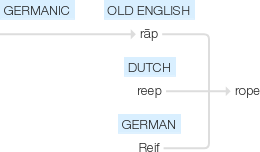Rope
Old English rāp, of Germanic origin; related to Dutch reep and German Reif .
wiktionary
From Middle English rop, rope, from Old English rāp(“rope, cord, cable”), from Proto-West Germanic *raip, from Proto-Germanic *raipaz, *raipą(“rope, cord, band, ringlet”), from Proto-Indo-European *h₁roypnós(“strap, band, rope”), from *h₁reyp-(“to peel off, tear; border, edge, strip”).
From Middle English ropen, rope(“to form ropes”), from rop(“rope”); see above.
From Middle English rop(“gut, intestine”), from Old English rop, ropp; compare Middle Dutch rop, roppe(“fish guts”).
The modern pronunciation results from phonological assimilation to Etymology 1.
etymonline
rope (n.)
Middle English rop, from Old English rap "strong, heavy cord of considerable thickness," from Proto-Germanic *raipaz (source also of Old Norse reip, West Frisian reap, Middle Dutch, Dutch reep "rope," Old Frisian silrap "shoe-thong," Gothic skauda-raip "shoe-lace," Old High German, German reif "ring, hoop"). Technically, only cordage above one inch in circumference and below 10 (bigger-around than that is a cable). Nautical use varies. Finnish raippa "hoop, rope, twig" is a Germanic loan-word.
It is attested by early 14c. as "a noose, a snare." Rope of sand (1620s) was an old figure for anything lacking coherence or binding power.
To know the ropes "understand the way to do something" (1840, Dana) originally was a seaman's term. The phrase on the ropes "about to be defeated" is attested from 1924, a figurative extension from the fight ring, where being in or on the ropes was a figure by 1829.
To be at the end of (one's) rope "out of resources and options" is attested by 1680s. An earlier expression was have too long rope "have too much freedom" (late 15c.).
Rope formerly also figured in slang and extended-sense expressions related to punishment by hanging, such as John Roper's window "a noose," rope-ripe "deserving to be hanged," both 16c. The figurative phrase give someone (enough) rope (to hang himself) is by 1680s.
rope (v.)
early 14c., ropen, "bind (someone) with a rope," from rope (n.). The meaning "mark off with rope" is from 1738; to rope (someone or something) in "secure for some purpose," frequently with a notion of entanglement, is by 1848. Related: Roped; roping.
